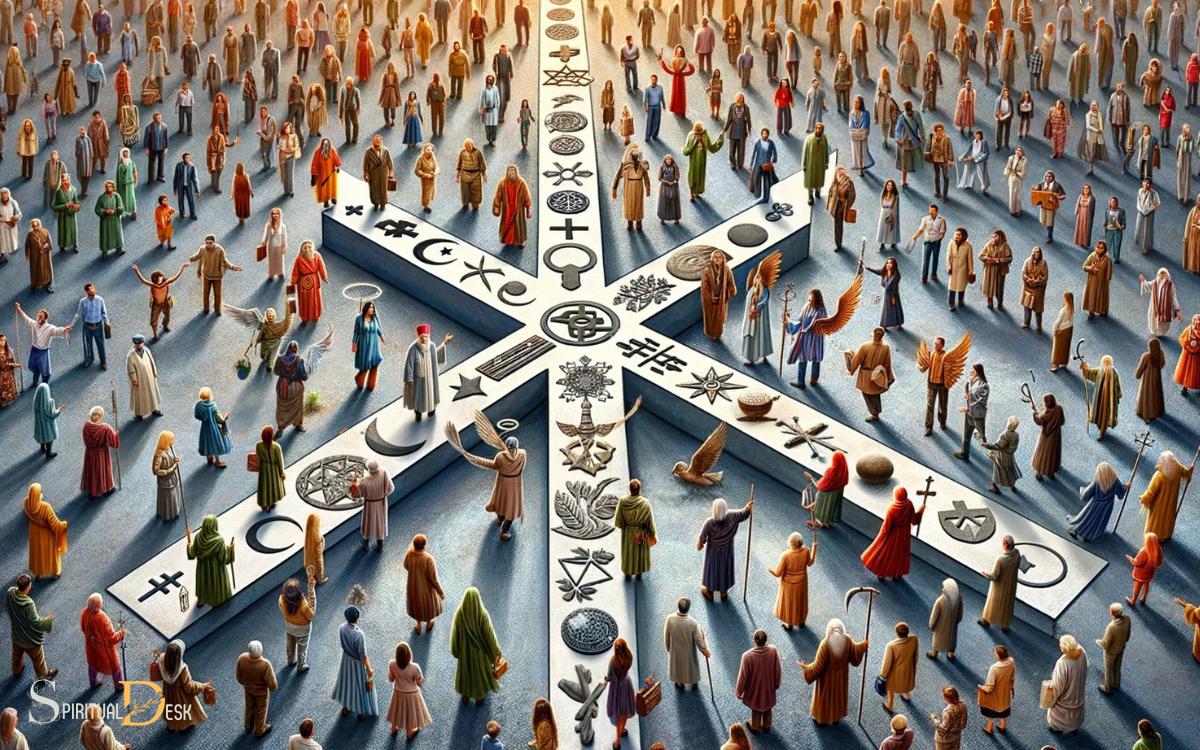Is OCD a Spiritual Problem? No!
No, Obsessive-Compulsive Disorder (OCD) is not a spiritual problem; it is a recognized mental health disorder characterized by repetitive, unwanted thoughts (obsessions) and behaviors (compulsions).
OCD is classified as an anxiety disorder by mental health professionals. It is characterized by two main components:
The exact causes of OCD are not fully understood, but a combination of genetic, neurological, behavioral, cognitive, and environmental factors are thought to play a role. OCD is not caused by spiritual factors, nor is it a result of personal weakness or a character flaw.
Effective treatments typically include a combination of psychotherapy (such as Cognitive Behavioral Therapy, specifically Exposure and Response Prevention) and medication (such as Selective Serotonin Reuptake Inhibitors, SSRIs).
As a neurobiological condition, OCD requires evidence-based medical treatment, not spiritual healing, to manage symptoms effectively.

Key Takeaway
Exploring the Differences: OCD and Spiritual Problems
| Aspect | OCD (Obsessive-Compulsive Disorder) | Spiritual Problem |
|---|---|---|
| Definition | A chronic mental health condition characterized by uncontrollable, reoccurring thoughts (obsessions) and behaviors (compulsions). | A difficulty or issue that pertains to an individual’s spiritual beliefs or practices, often involving a sense of disconnection or ethical/moral struggles. |
| Nature | Psychological and neurobiological. | Ethereal, transcendent, and philosophical. |
| Causes | Biological factors, genetic predisposition, brain structure and functioning, environmental factors. | Personal beliefs, existential crises, moral or ethical dilemmas, loss of faith or spiritual direction. |
| Treatment | Medication (SSRIs), psychotherapy (CBT), self-care strategies. | Guided spiritual practice, counseling from spiritual leaders, meditation, prayer, reflection. |
| Professional Involvement | Psychiatrists, psychologists, therapists. | Spiritual leaders, religious counselors, or mentors. |
| Diagnostic Criteria | DSM-5 criteria for diagnosis. | Varies based on religious or spiritual beliefs and is not clinically diagnosed. |
| Common Misconceptions | That OCD is just about cleanliness or orderliness; that patients can simply stop their behaviors. | That spiritual problems are a sign of weak faith or moral failing; that they can be resolved solely through prayer or divine intervention. |
| Societal/Cultural Impact | Stigma associated with mental health disorders, causing individuals to sometimes hide symptoms. | Stigma or misunderstanding about spiritual struggles, which may lead to isolation or ostracization within one’s community. |
| Relationship with the Self | Often involves a struggle with self-control and self-confidence due to intrusive thoughts and rituals. | May involve a quest for identity, meaning, and purpose, and a reconciliation of self with beliefs and values. |
Understanding OCD and Spiritual Perspectives

Understanding OCD from a spiritual perspective involves examining the interplay between obsessive-compulsive behaviors and individuals� spiritual beliefs and practices.
From a spiritual standpoint, OCD can be perceived as a conflict between the mind and the spirit, resulting in distressing thoughts and compulsive rituals.
Many spiritual traditions emphasize the importance of inner peace, freedom from attachment, and surrender to a higher power, which can offer a different lens through which to understand and cope with OCD.
Some individuals may find solace in prayer, meditation, or other spiritual practices as a means of managing their symptoms.
However, it�s essential to approach this perspective with sensitivity, recognizing that OCD is a complex mental health condition that often requires professional treatment.
Integrating spiritual beliefs with evidence-based therapeutic approaches can provide a holistic framework for managing OCD.
The Role of Belief Systems in OCD

The influence of belief systems on OCD manifests in the interplay between individuals� spiritual or religious convictions and the manifestation and management of obsessive-compulsive behaviors.
For many individuals, their belief systems can significantly impact the way they perceive their OCD symptoms.
Some may interpret their intrusive thoughts or compulsions through a spiritual lens, attributing them to divine punishment or spiritual impurity.
This can lead to feelings of guilt, shame, and a heightened sense of responsibility to perform rituals or seek reassurance.
On the other hand, belief systems can also serve as a source of comfort and strength, providing a framework for understanding and coping with OCD.
Understanding the role of belief systems in OCD is crucial for developing effective, culturally sensitive treatment approaches that respect and integrate individuals� spiritual perspectives.
Spiritual Practices and OCD Management

In addressing the management of OCD from a spiritual perspective, it is essential to consider the role of religion in coping with the condition.
Additionally, the practice of mindfulness has shown promise in helping individuals manage their OCD symptoms.
Moreover, the influence of faith on OCD treatment and its potential impact on the overall well-being of individuals with OCD warrants careful exploration.
Religion and OCD Coping
Religion plays a significant role in the coping and management of OCD through the practice of spiritual rituals and beliefs.
Individuals with OCD often find solace and support in religious activities, which can provide a sense of structure and comfort.
Below are some common spiritual practices and beliefs that individuals with OCD may use for coping and management:
| Spiritual Practices and Beliefs | Description |
|---|---|
| Prayer | Seeking comfort and guidance through prayer. |
| Meditation | Engaging in quiet reflection and mindfulness. |
| Rituals | Participating in religious ceremonies and traditions. |
| Scripture | Finding strength and guidance in religious texts. |
| Community Support | Seeking support from religious communities and leaders. |
Mindfulness for OCD

Mindfulness is an integral component of spiritual practices for managing OCD symptoms. This practice involves maintaining a moment-by-moment awareness of thoughts, feelings, bodily sensations, and the surrounding environment.
For individuals with OCD, mindfulness can help cultivate a non-judgmental, accepting awareness of the present moment, reducing the tendency to get caught up in obsessive thoughts or compulsive behaviors.
Through mindfulness meditation, individuals can develop the ability to observe their thoughts and feelings without attaching undue significance to them, ultimately diminishing the power of OCD symptoms.
Research has shown that mindfulness-based interventions can lead to significant reductions in OCD symptoms and related distress.
By incorporating mindfulness into their spiritual practices, individuals with OCD can effectively manage their symptoms and improve their overall well-being.
Faith and OCD Treatment

Spiritual practices such as prayer and meditation can provide individuals with OCD a sense of solace and inner peace, further enhancing their ability to manage symptoms and improve overall well-being.
Engaging in regular prayer or meditation can help individuals with OCD to calm their minds, reduce anxiety, and gain a greater sense of control over their thoughts and behaviors.
These practices can also foster a deeper connection to one�s faith and spirituality, offering a source of strength and comfort in the face of OCD challenges.
Incorporating spiritual practices into OCD treatment can complement traditional therapeutic approaches and empower individuals to cope with their symptoms more effectively.
Individuals need to work with mental health professionals who understand and respect the role of faith in their lives, ensuring a holistic approach to OCD management.
Exploring the Connection Between Faith and OCD

The exploration of the connection between faith and OCD involves considering the use of faith-based coping strategies and the impact of religious beliefs on individuals with OCD.
Understanding how faith can influence the management and experience of OCD is essential for providing holistic support to those affected by the condition.
By examining these points, we can gain insight into the potential role of faith in addressing the spiritual aspects of OCD.
Faith-Based Coping Strategies
An increasing number of individuals with OCD turn to faith-based coping strategies to manage their symptoms and explore the connection between faith and OCD.
Faith-based coping strategies often involve prayer, meditation, seeking support from religious communities, and finding comfort in religious texts.
These strategies can provide a sense of purpose, hope, and acceptance, which are crucial for managing the distressing symptoms of OCD.
Many find that their faith helps them navigate the challenges of OCD by providing a framework for understanding their experiences and a source of strength to endure difficult times.
Additionally, faith-based coping strategies can offer a sense of control and a way to find meaning amid OCD symptoms.
Exploring the use of faith in managing OCD offers valuable insights into the holistic approach to mental health. This leads us to consider the impact of religious beliefs on individuals with OCD.
Impact of Religious Beliefs
Exploring the connection between religious beliefs and OCD yields valuable insights into the impact of faith on individuals managing the condition.
When considering the impact of religious beliefs on OCD, it is important to understand:
- Role of Guilt: Religious teachings emphasizing sin and guilt can exacerbate OCD symptoms related to guilt and morality.
- Seeking Reassurance: Individuals may seek reassurance from religious figures or texts, leading to compulsive behaviors.
- Ritualistic Practices: Religious rituals may intersect with OCD compulsions, complicating the management of symptoms.
- Fear of Blasphemy: OCD intrusive thoughts often involve religious blasphemy, causing distress for those with strong faith.
- Support Networks: Religious communities can provide a source of support, understanding, and acceptance for individuals with OCD.
Understanding these intersections is crucial in providing holistic support for individuals managing OCD within religious contexts.
Addressing Stigma and Misconceptions in Spiritual Communities

Addressing stigma and misconceptions in spiritual communities requires education, open dialogue, and a commitment to promoting understanding and support for individuals with OCD.
It is essential to educate spiritual communities about the nature of OCD, its neurobiological basis, and the impact of stigma on individuals.
Open dialogue can help dispel misconceptions and foster empathy and support. Spiritual leaders and community members can play a pivotal role in creating an inclusive and compassionate environment that embraces individuals with OCD.
By fostering understanding and support, spiritual communities can become safe spaces where individuals feel accepted and supported in their journey towards healing.
This approach not only enhances the well-being of individuals with OCD but also aligns with the core principles of compassion and empathy advocated by many spiritual traditions.
Seeking Support: Integrating Mental Health and Spirituality

Integrating mental health and spirituality involves fostering a holistic approach to support individuals with OCD.
This approach recognizes the importance of addressing both the psychological and spiritual aspects of OCD to provide comprehensive care.
Here are five key considerations for integrating mental health and spirituality:
- Collaboration between mental health professionals and spiritual leaders to create a supportive network for individuals with OCD.
- Incorporating mindfulness and meditation practices into OCD treatment to address both mental and spiritual well-being.
- Providing education and awareness within spiritual communities to reduce stigma and misconceptions surrounding OCD.
- Offering support groups that integrate both mental health strategies and spiritual guidance for individuals with OCD.
- Encouraging individuals with OCD to draw strength from their spiritual beliefs as a source of comfort and resilience in their recovery journey.
Conclusion
The intersection of spirituality and OCD is a complex and multifaceted issue. By addressing the role of belief systems, exploring spiritual practices, and seeking support, individuals can navigate the challenges of OCD within a spiritual context.
The allusion to the interconnectedness of mind, body, and spirit underscores the importance of holistic approaches in managing OCD within spiritual communities.






